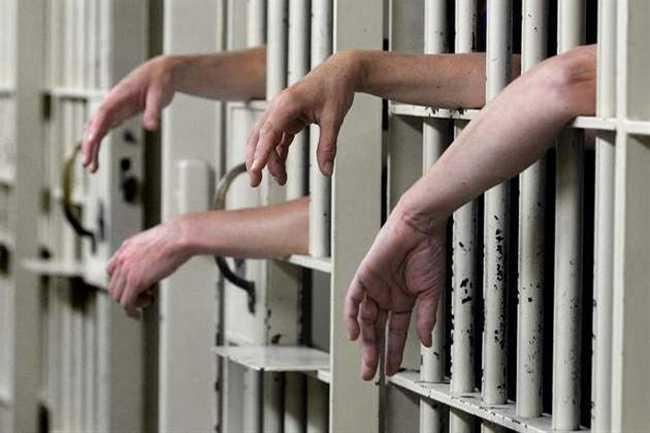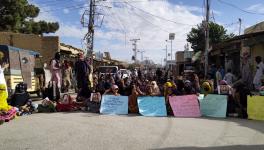COVID-19: Public Health Experts Call for Decongesting Prisons to Safeguard Inmates

Representational Image. Image Courtesy: Jagran
Forty-five organisations and 187 professionals from the health and allied sectors and concerned citizens from India and abroad have issued an appeal to urgently revise criteria for the release of prisoners on bail or parole to decongest prisons during the COVID-19 pandemic by giving priority to health status and age-related vulnerabilities of the prisoners.
The letter, dated June 23, has been sent to Chief Justices of all Indian states and Union Territories, National Legal Services Authority, State Legal Services Authorities, State Prison Authorities and High Powered Committees (HPCs) constituted as per orders by the Supreme Court dated March 23, for releasing prisoners to reduce overcrowding in prisons as part of the pandemic response. The signatories of the letter include organisations like the All India People's Science Network, Jan Swasthya Abhiyan, National Alliance of People's Movements, and Human Rights Law Network.
In a statement released on Monday, the authors of the letter and those who endorsed it pointed out that overcrowding in Indian prisons has always been an issue, given that trial prisoners constitute nearly 70% of the inmates. The formation for HPCs for the decongestion of prisons during the pandemic was hence welcomed by concerned citizens. However, the statement said that “these measures have been inadequate from a public health and human rights perspective and also uneven across states and UTs.”
“Commonwealth Human Rights Initiative (CHRI) reported that during the first wave, over 61,100 prisoners were released, which achieved only about 15.4% overall reduction in occupancy rate. Additionally, this is inadequate to address overcrowding of 40% of the Indian prisons including 134 prisons having overcrowding from 100% to 636%,” the letter said. Additional complexities have also stemmed from the ravaging second wave of the pandemic. Almost 90% of the prisoners who were released last year had returned to prisons in February and March this year.
The criteria employed for release on bail or parole by HPCs are based upon the nature of the offence and years of imprisonment. It does not take into account the age, health status and associated vulnerabilities or disabilities of prison inmates. The statement by the signatories said: “These vulnerabilities need to be central to determine the release of prison inmates, both because it is being done in response to the ravaging pandemic; and because the government is entrusted with upholding the rights of prisoners in alignment with Article 21 of the Constitution of India.”
Only five state HPCs considered cases of elderly prisoners for release; only three included criteria like occurrence of comorbidities, chronic diseases and certain pre-existing conditions like chronic diabetes, HIV, heart condition, cancer, Hepatitis B or C, and Tuberculosis. Only the Punjab HPC specifically mentioned pregnant women as a category for release.
“A long-standing issue of strengthening prisons’ health care services needs immediate attention to ensure prison inmates’ access to timely and quality healthcare (preventive and treatment). Prison inmates during this pandemic are at heightened health risk both for their vulnerabilities arising of overall poor prison conditions; and lack of access to appropriate and quality COVID-19 health care resources,” it said.
The signatories have urged the authorities to prioritise safeguarding the health of prisoners, including treating all prisoners on par for release, irrespective of charges/offense and modifying the categories of prisoners to be considered for release. They said priority must be given to age, vulnerability and health status of the prisoners, especially the under-trial prisoners; including medical and other public health professionals, health department officials and relevant civil society organisations in the HPCs to facilitate and monitor the release of prison inmates.
They added that alternative forms of custody such as house arrest and open prisons may be considered and that it should be ensured that health facilities for testing, treatment and medical care are made available by linking up with local hospitals from public and private sectors for safeguarding health of those who are not released, to ensure their access to timely and dignified health care.
They have also urged the authorities to take this opportunity to ensure speedy trials, granting of bail and releasing those who have been granted bail, offer vaccination to all prisoners in a safe and non-coercive manner, and prioritise improvement of prison conditions and implement long overdue prison reforms for improving the living conditions and health facilities in prisons, such as increasing budget for prison health, and appointment of requisite medical staff.
Get the latest reports & analysis with people's perspective on Protests, movements & deep analytical videos, discussions of the current affairs in your Telegram app. Subscribe to NewsClick's Telegram channel & get Real-Time updates on stories, as they get published on our website.
























